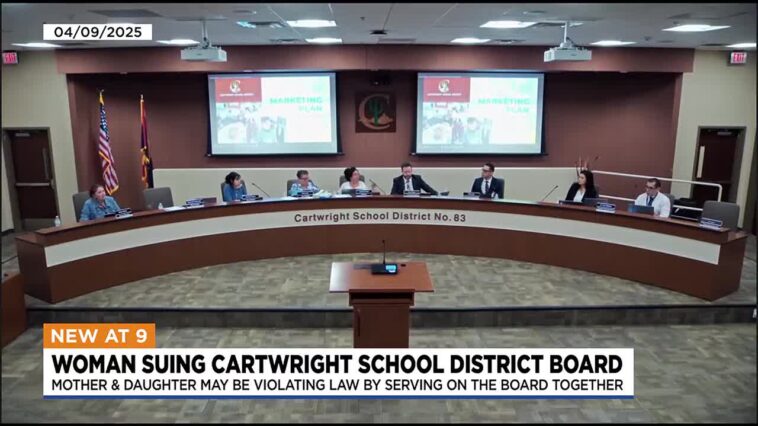
Examining the Conflict of Interest in Cartwright School Board Leadership
The controversy unfolding within the Cartwright School District has sparked a heated debate over conflict of interest and nepotism in educational governance. A lawsuit filed by Cecilia Moreno, a concerned parent with children enrolled in the district, has challenged the legitimacy of board president Lydia Hernandez and her daughter Cassandra Hernandez serving concurrently on the board. This development touches on several tricky parts of school governance and raises significant questions regarding legal eligibility and transparency in decision-making.
At the heart of the dispute is the allegation that the familial relationship between the board president and her daughter constitutes a conflict of interest under Arizona state law. Moreno asserts that under this law, close family members who have cohabited within the last four years should not serve on the board together. By contesting Cassandra Hernandez’s election last November, Moreno is not merely questioning the board’s composition but also the broader effect that family ties may have on board decisions and community trust.
This case is laden with questions about fairness, accountability, and the subtle parts of legal standards governing public office. While the board president maintains that her daughter did not reside with her as required to violate the law, Moreno has presented evidence that suggests otherwise. As the legal proceedings advance and the judge is set to weigh the evidence in July, the situation continues to unfold with implications that stretch far beyond the district itself.
The Problem of Nepotism in Education: A Closer Look
Nepotism—the favoring of relatives or friends, especially by giving them positions of authority—is not a new issue in public institutions, but its appearance on a school board is particularly sensitive. Nepotism in educational settings brings with it tangled issues that undermine public trust and can lead to decisions that are more about personal loyalty than sound policy. In this case, accusations that family influence skewed a crucial board decision have resonated strongly among parents and community members.
Parents like Cecilia Moreno argue that the board’s decision-making process has been compromised by these personal relationships. Moreno contends that the board’s vote to put the superintendent on leave was not discussed publicly and, in her view, was influenced by private family conversations, completely disregarding the state’s open meeting law. The accusation implies that if family ties can override the conventional processes of discussion and debate, the foundational values of transparency and integrity in public office are at risk.
Critics of the current board composition claim that even subtle influences—such as family dynamics and the shared household environment—can lead to outcomes that do not serve the best interests of the entire school district. They see these influences as the hidden complexities that can warp policy decisions and hinder fair representation of the community’s voice. With the legal challenge now in court, many are keeping a close eye on how this matter might set a precedent for similar cases in other districts.
- Family relationships interfering with impartial decision-making
- Violation of open meeting law due to undisclosed discussions
- Long-term impact on public trust in educational institutions
Securing a transparent and fair decision-making process in this environment is super important for maintaining the credibility of the school district. Ultimately, the public looks for reassurance that elected officials will always prioritize the welfare of the students and the community over personal or familial interests.
Implications of Open Meeting Law Violations in Board Decisions
One of the more intimidating aspects of the case is the allegation surrounding the violation of open meeting laws. These laws are designed to ensure that deliberations and decisions made by a public body, such as a school board, unfold in a process that is accessible to the public. The claim that the decision to leave the superintendent’s post was influenced by private, undisclosed discussions touches on legal principles that are both critical and nerve-racking for stakeholders.
Open meeting laws play a super important role in safeguarding against decisions that are made behind closed doors. If board members or their close relatives are conducting off-the-record discussions that influence official actions, it is a serious breach of both legal mandates and public ethics. Moreno’s assertion that the board’s failure to discuss the matter in a public forum is evidence of collusion is one of the key points underpinning her case.
Furthermore, the accusation that board members may have been “steering through” discussions in their private spaces or at home—rather than in a public, documented setting—raises significant concerns about the integrity of the process. The possible violation is not merely a legal technicality; it is emblematic of a broader issue where trust and accountability can slip away if transparency is not observed.
Below is a table summarizing the key elements that underscore the importance of adherence to open meeting laws in the context of school boards:
| Key Element | Description |
|---|---|
| Public Access | Ensures that meetings are open to citizens to observe the decision-making process. |
| Documentation | All discussions and decisions are recorded to maintain transparency. |
| Accountability | Prevents conflicts of interest and ensures that decisions reflect the needs of the public. |
| Legal Compliance | Adheres to state and local statutes intended to prevent collusion and favoritism. |
Impact on Trust and Governance: The Role of Family Ties in Decision Making
In any public institution, trust is a must-have element that binds community members to their leaders. The involvement of close family members on the school board raises profound concerns about how decisions might be influenced by personal loyalties rather than the public interest. Moreno’s perspective is that the dual presence of a mother and daughter on the board creates a scenario where one might inadvertently or deliberately affect the other’s judgment, thereby impacting the board’s overall governance.
This situation is a prime example of how familial dynamics can introduce subtleties that, if left unchecked, may skew public policy. Whether it is in the way votes are cast or in the process by which decisions are made, the influence of family ties can add layers of complicated pieces to an already delicate system. Critics warn that this type of arrangement can lead to decisions being made in private circles, leaving little room for independent opinions or robust discussion among members.
The community response to this controversy highlights the intricate balance between trust in elected officials and the need for accountability. For many, the mere appearance of nepotism is enough to erode faith in the institution’s ability to serve the community impartially. It serves as a wake-up call to re-examine existing protocols to ensure that every board decision is made free of undue influence or hidden complexities.
Below are some key points regarding the impact of family ties on public governance:
- Compromised Impartiality: Family relationships may lead to biased decision-making where personal loyalty overshadows objective judgment.
- Peer Perception: Public confidence in the board’s ability to act in the community’s best interest can suffer significantly.
- Tangled Issues: The potential for conflicts to arise in areas of decision-making that should be transparent and publicly accountable.
- Precedent for Future Cases: How this case is resolved could influence similar disputes in other districts, setting a legal standard for future governance.
This case, imbricated in both legal and ethical challenges, reminds us that when family ties mix with public office, one must be extra cautious to ensure that every decision made is done so with fairness and clarity. As the community and the courts review the evidence, the outcome will likely prompt substantial discussions about the subtle parts that make up effective governance.
Legal Foundations and Evidence Presented in the Lawsuit
In legal disputes such as this, the evidence presented plays a super important role in determining the outcome. Moreno’s case hinges on the interpretation of an Arizona statute, which disallows close family members who have cohabited recently from serving on the same school board simultaneously. This legal foundation, though seemingly straightforward, is loaded with issues that require careful interpretation and application.
Moreno has submitted evidence that she argues demonstrates a breach of the law. Key to her argument is the assertion that Cassandra Hernandez’s eligibility was compromised due to her close familial ties with Lydia Hernandez. The evidence puts forward the claim that, contrary to the board president’s statements, the daughter did indeed share a household with her mother in the relevant time frame.
The legal argument presented centers around several core points:
- Eligibility Requirements: The exact wording of the statute regarding the eligibility of family members to serve on a public board.
- Lack of Transparency: Allegations that vital discussions about major decisions, such as the suspension of the superintendent, were held privately.
- Chain of Influence: The potential for one board member to exert undue influence over another due to their familial relationship.
Below is a simplified breakdown of the legal arguments in table format:
| Legal Point | Argument Presented |
|---|---|
| Statutory Interpretation | The law prohibits cohabiting family members from serving together, aiming to prevent nepotism. |
| Evidence of Cohabitation | Moreno has provided documentation and testimony that questions the board president’s claim about living arrangements. |
| Transparency in Decision-Making | The allegation that critical board decisions were made in private raises issues with open meeting law. |
| Conflict of Interest | Family influence may have affected the voting process regarding major administrative decisions. |
The outcome of this legal challenge will undoubtedly have far-reaching consequences. It forces us to look beyond the immediate dispute and consider how similar cases might be treated in the future. The decision by the judge this July is anticipated with considerable anxiety, as stakeholders on both sides of the issue dread the possibility of a slippery slope in governance norms.
Public Reaction and the Debate Over Nepotism in School Boards
The public’s response to the allegations surrounding nepotism in the Cartwright School District has been both passionate and divided. Parents, educators, and community leaders have voiced concerns over whether the board’s composition undermines the democratic process. Many believe that any appearance of favoritism—no matter how slight—can sabotage the trust needed for efficient governance.
Supporters of Moreno’s stand argue that the board’s decisions are tainted by hidden influences and should be subject to rigorous scrutiny. They feel that allowing such arrangements without clear accountability muddles the fine points of board decision-making. On the other hand, defenders of the current board composition insist that personal relationships do not necessarily equate to bias, emphasizing that individuals are capable of making their own decisions independent of familial liaisons.
This debate is a perfect example of how sensitive and complicated pieces of public sentiment can be when it comes to educational oversight. While legal interpretations and definitions remain at the forefront of the discussion, the emotional and social implications of perceived nepotism are just as influential in shaping public opinion.
Key points emerging from the public debate include:
- Questions over whether familial ties automatically translate to conflict of interest.
- Concerns that decisions may be made in a biased manner, even if unintentionally.
- An appreciation for stringent legal safeguards to ensure every board decision is made with transparency.
- The need for the community to remain vigilant and hold elected officials accountable.
These points underscore a broader issue: the global need for public institutions to be beyond reproach when it comes to ethics and impartiality. The discussion, while full of problems and nervous energy, also opens the door for reform and dialogue about more robust processes for electing and regulating school board members.
Propositions for Reform: Guarding Against Nepotism in School Boards
As the case continues to gather momentum, it also serves as a catalyst for a broader conversation about reform in school board governance. Critics argue that beyond this specific lawsuit, there is a need to reform processes to prevent any possibility of nepotism. Working through these issues may seem overwhelming at first, but there are several practical steps that can help ensure accountability and public trust.
One recommendation is to revise eligibility criteria for board membership to explicitly address familial relationships. By clarifying who can and cannot serve together, lawmakers can remove any ambiguous pieces that might allow for subtle influence or bias. Other proponents of reform suggest mandatory disclosure of any personal relationships that exist among board members, as well as regular audits of board decision-making processes.
Below are some proposals that community leaders and policy experts have put forward to tackle these tangled issues:
- Amending Statutory Guidelines: Clearly define the household criteria for eligibility, ensuring that no close family members can serve simultaneously.
- Enhancing Transparency Measures: Mandate public disclosures and detailed minutes for all board meetings to prevent any secretive discussions.
- Independent Oversight: Establish an external review board to audit board decisions regularly, ensuring no undue influence from familial ties.
- Public Engagement: Encourage stakeholder meetings and forums where community members can voice their concerns and suggestions regarding governance practices.
Implementing these reforms might help to clear up many of the confusing bits and tangled issues surrounding school board elections and decision-making. By taking a proactive stance, communities can figure a path toward governance that is both transparent and free from the risk of nepotism.
Moreover, these measures could serve as a benchmark for other districts grappling with similar challenges. Transparency, accountability, and the assurance of impartial decision-making are all super important for the functioning of any public institution, especially those responsible for the education and welfare of children.
Looking Ahead: The Ripple Effects of This Legal Battle
The resolution of this case has the potential to create ripple effects that extend well beyond the confines of the Cartwright School District. Legal experts and community leaders alike are paying close attention to the judge’s decision expected in July, which could set a precedent for handling nepotism and transparency issues in educational governance across the state, and perhaps even nationwide.
If the judge rules in favor of Moreno, it may prompt a re-evaluation of how school boards are elected and how conflicts of interest are managed. Such an outcome could inspire legislative action to close any gaps in the current system that allow for family members to serve in positions where they might inadvertently influence one another’s decisions.
On the flip side, a decision supporting the current board’s composition could leave a lingering sense of mistrust among cautious parents and community members. It would underscore the need for more robust internal policies governing family involvement in public office. Either way, the eventual verdict is likely to be a turning point, one that forces policymakers and administrators alike to take a closer look at the subtle parts of their governance structures.
In the meantime, communities must remain engaged and informed. As stakeholders await the outcome, keeping the conversation alive about transparency and accountability in school boards is critical to ensuring that educational institutions continue to serve the best interests of their students and the wider public.
Conclusion: The Need for Continued Vigilance and Reform in Educational Governance
In wrapping up the discussion on the controversial case involving the Cartwright School Board, it is clear that the situation is far from black and white. With accusations of nepotism and violations of open meeting laws at its core, this matter exposes several complicated pieces about how public institutions are managed and how critical transparency is in upholding the integrity of educational governance.
The legal challenge spearheaded by Cecilia Moreno forces us to take a closer look at the fine points of statutory interpretation, household eligibility requirements, and the influence of family ties on public decision-making. As the evidence is examined and debated in court, the outcome will not only affect the immediate future of the Cartwright School District but could well influence broader policy standards across similar institutions.
The multiple layers of this issue—from the potential hidden influences in board votes to the broader societal implications of unchecked nepotism—demand that policymakers, community leaders, and the public work together to ensure that educational governance remains transparent, accountable, and free from undue influence.
As we move forward, the key takeaways from this case include:
- The importance of clear and unambiguous statutes that prevent conflicts of interest in public office.
- Maintaining strict adherence to open meeting laws to guarantee transparency in all public decision-making processes.
- The need for mechanisms that ensure public trust is not eroded by the subtle twists and turns of familial influence within board decisions.
- Implementing proactive reforms that address and mitigate any potential for nepotism in school boards and other public organizations.
In a time when trust in public institutions is essential, every effort must be made to preserve the public’s confidence by ensuring that school boards—not only in Arizona but across the nation—operate with the highest levels of transparency, accountability, and integrity. As communities and legal authorities await the final ruling, this case serves as a powerful reminder that safeguarding the interests of the public is a continuous effort, one that requires vigilance, reconsideration, and, when necessary, meaningful reform.
The debate over nepotism in school governance may indeed be nerve-racking and loaded with problems, but it is precisely by confronting these challenging issues head-on that we can work to build systems that are fair, transparent, and truly in service of our children’s education. Only by ensuring that every board decision is made openly and without undue influence can we maintain the delicate balance of trust that is so critical to our community’s future.
Originally Post From https://www.azfamily.com/2025/05/08/parent-files-lawsuit-against-cartwright-school-board-president-citing-nepotism/
Read more about this topic at
Fresno Unified’s New Supe Allegedly Helped Promote Her …
Settlement reached in St. Louis nepotism case


